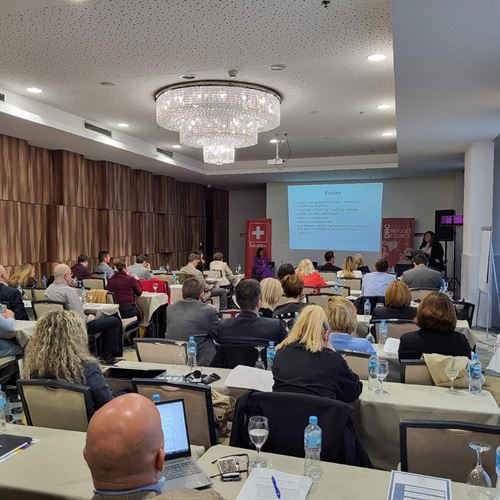Responding to the health needs of people on the move is an important segment of mixed migration. Therefore, the second regional conference, Response to Public Health Challenges of Mixed Migration, has been held in Sarajevo, organized by the Danish Refugee Council with the support of the Embassy of Switzerland in Bosnia and Herzegovina. The gathered experts from Bosnia and Herzegovina, Serbia, Croatia, and Greece exchanged knowledge and good practices in solving the most important public health challenges of mixed migration on the Balkan route, which is very important for the well-being of people on the move and the resident population.
Dr. Goran Čekez opened the conference on behalf of the Ministry of Health of FBiH emphasizing that humanitarian actors, non-governmental organizations, and state institutions, since the arrival of the first people on the move on the territory of Bosnia and Herzegovina, have, thanks to good cooperation, reduced all risks to public health and successfully responded to the health needs of a people on the move. The best indicator of this is the COVID-19 pandemic. Namely, since the first confirmed positive case in Bosnia and Herzegovina, organizations involved in responding to the needs of mixed migration in cooperation with state institutions have taken a series of preventive measures, from disinfecting spaces, insisting on enhanced hygiene, organizing workshops with the migrant population in their native languages, and later also raising awareness about immunization. Through advocacy and good cooperation with ministries of health and public health institutes, people on the move have been included in the regular process of immunization against COVID-19. A good example is the immunization of children, who often did not have the opportunity to receive a vaccine for several years or did not even have the opportunity in their own country to do such a thing.
Professor Aida Pilav had the honor of introducing us to the regional conference on Public health challenges in the Western Balkans: Past, Present, and Future, emphasizing that this year marks 100 years of institutional public health in Bosnia and Herzegovina.
Dr. Jasmina Jandrić Kočić, from the Public Health Institute of Sremska Mitrovica in Serbia, gave an Epidemiological overview of the migrant crisis in Serbia, sharing experiences, challenges, and lessons. Dr. Jandrić Kočić highlighted that communication between humanitarian actors and state institutions in Serbia was a challenge in responding to the needs of mixed migration and also responding to the health needs of women and providing them with the necessary examinations, as well as the immunization of children and their inclusion in the education system. Fortunately, they all responded successfully, thanks to everyone's awareness that they are there to help people in need.
Dr. Matijana Jergović from the Teaching Institute for Public Health "Dr. Andrija Štampar", Zagreb, Croatia, presented the topic Assessing and communicating health risks for displaced population, emphasizing the importance of prevention as well as assessment, management, and communication of risks. Dr. Apostolos Veizis from INTERSOS from Greece spoke on the topic of People on the move, public health and Access to Health: Greece Experience. Dr. Veizis emphasized that the lack of hygiene, sanitary conditions, and insufficient exposure to fresh air can affect the health of people staying in migrant camps and that the longer people walk to their desired destination, the more severe injuries they have to their skin, tissues, and extremities, and that they are susceptible to infections.
Prof. Miloš Delić, translator of the Humanitarian Center for Integration and Tolerance from Novi Sad, Serbia, spoke about The significance of cultural mediation in the public health response to mixed migration, stressing how important it is to understand the culture from which a person on the move comes in order to gain trust and adequately respond to needs, especially of a health nature. The final lecture was Analytical Comparison on Public Health Challenges of Mixed Migrations in Bosnia and Herzegovina between 2021 and 2022, prepared by Dr. Marko Isajlović, medical advisor at the Danish Refugee Council in BiH, who said that due to changes in the demographics of the population that came to our country, there is a big difference in morbidity with an increase in skin and infectious diseases during these two years.
The conference ended with the panel discussion Strengthening Regional Cooperation in Health Care and Epidemiological Monitoring of Mixed Migrations.
